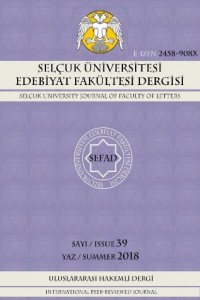Öz
Cezayirli yazar Assia Djebar, Uçsuz Bucaksız Hapishane (1995) isimli eserinde, ataerkil düzenin zulmünden kurtulmanın kadınlar için mümkün olup olmadığını ve hangi yöntemlerle mümkün olabileceğini inceler. Romanın başlığı sömürgecilik ve ataerkil düzenin şekillendirdiği bir ülkenin uçsuz bucaksız bir hapishane olduğunu ima eder. Muhafazakar (ataerkil) ideolojinin gücü, kadınların hayatının pekçok boyutunda kendini gösterir. Roman bir yolculuğu anlatır. Bu anlamda bir arayış anlatısı olarak da okunabilir ve bir yerden diğerine olan yolculuk aynı zamanda bir dilden diğerine geçişe tekabül eder. Kadın anlatıcı kendi şahsi hikayesini Cezayirli kadınların kollektif hikayesiyle harmanlar. Modern bir kadın olarak özgürce yaşama arzusu ve geleneksel İslami kuralların dikte ettiği yaşam arasında bölünmüştür. Diğer yandan Djebar, sömürgecinin dilini benimsemeyi bir çeşit ölüm ile özdeşleştirir. Baba dili olan Fransızca sosyal hayatta özgürlüğe açılan bir kapı olsa da aynı zamanda sömürgeci otoritesinin dilidir ve anlatıcının anadili olan Arapçayla bağlarını koparır. Anlatıcının gerçek kimliğini bulmak için atalarına anadilini kullanarak ulaşması gerekmektedir. Bu gözlemler ışığında, bu makalenin amacı Uçsuz Bucaksız Hapishane isimli eserde yansıtıldığı şekilde kadınların gördüğü zulmü eleştirel olarak incelemektir.
Anahtar Kelimeler
Assia Djebar Uçsuz Bucaksız Hapishane sömürgecilik dil zulüm
Kaynakça
- Ahnouch, Fatima and Pamela Genova (1996). “Assia Djebar: The Song of Writing”. World Literature Today 70 (4): 795-797.
- Djebar, Assia (1999). So Vast the Prison. New York: Seven Stories Press.
- Drissi, Susannah (2005). ”The Quest for Body and Voice in Assia Djebar’s So Vast The Prison”. Comparative Literature and Culture 7 (3): 2-8.
- Fanon, Frantz (1965). A Dying Colonialism. Middlesex: Penguin Books ltd.
- Faulkner, Rita (1996) “A. Assia Djebar, Frantz Fanon, Women, Veils and Land”. World Literature Today 70 (4): 847-855.
- Flores, Andrea (1999). ”Ruin and Effect Assia Djebar’s So Vast the Prison” Alif: Journal of Comparative Poetics 20: 299-319.Vaste est la prison”
- Hiddleston, Jane (winter, 2004). “Feminism and te Question of ‘Woman’ in Assia Djebar’sVaste est la Prison” Research in African Literature 35 (4): 91-104.
- Hitchcock, Peter (2009). The Long Space: Transnationalism and Postcolonal Form.San Fransisco: Stanford University Press.
- Lazarus, Joyce (2010). ”Writing as Resistance: Assia Djebar’s Vaste est la prison”. Journal of International Women’s Studies 11(4): 83-96.
- Ringrose, Priscilla (2006). Assia Djebar: In Dialogue with Feminism. Amsterdam: Rodopi.
Öz
In So Vast the Prison (1995), Assia Djebar examines whether deliverance from the oppression of patriarchy is possible for women and by which means it can be achieved. The title of the novel suggests that a country shaped by colonialism and patriarchy is one vast prison. The power of conservative (patriarchal) ideology is manifested in almost every aspect of women’s lives. The novel is written in the form of a journey. In this sense, the novel can be read as a quest narrative and the movement from one place to another also corresponds to movement from one language to another. The female narrator blends her personal story with the collective history of Algerian women. She is torn between her desire to live the liberated life of a modern woman and life dictated by traditional Islamic mores. Djebar associates the adoption of the colonialist’s language with a form of death. French, the paternal language of the narrator, is a gateway to freedom in the social world - yet it is the language of colonial authority. It severs the narrator’s ties with her maternal tongue which is Arabic. In order to find her true identity, she has to reach out to her ancestors in her maternal tongue. In the light of these observations, the aim of this article is to critically examine the oppression of women as portrayed in So Vast the Prison.
Anahtar Kelimeler
Assia Djebar So Vast the Prison colonialism language oppression
Kaynakça
- Ahnouch, Fatima and Pamela Genova (1996). “Assia Djebar: The Song of Writing”. World Literature Today 70 (4): 795-797.
- Djebar, Assia (1999). So Vast the Prison. New York: Seven Stories Press.
- Drissi, Susannah (2005). ”The Quest for Body and Voice in Assia Djebar’s So Vast The Prison”. Comparative Literature and Culture 7 (3): 2-8.
- Fanon, Frantz (1965). A Dying Colonialism. Middlesex: Penguin Books ltd.
- Faulkner, Rita (1996) “A. Assia Djebar, Frantz Fanon, Women, Veils and Land”. World Literature Today 70 (4): 847-855.
- Flores, Andrea (1999). ”Ruin and Effect Assia Djebar’s So Vast the Prison” Alif: Journal of Comparative Poetics 20: 299-319.Vaste est la prison”
- Hiddleston, Jane (winter, 2004). “Feminism and te Question of ‘Woman’ in Assia Djebar’sVaste est la Prison” Research in African Literature 35 (4): 91-104.
- Hitchcock, Peter (2009). The Long Space: Transnationalism and Postcolonal Form.San Fransisco: Stanford University Press.
- Lazarus, Joyce (2010). ”Writing as Resistance: Assia Djebar’s Vaste est la prison”. Journal of International Women’s Studies 11(4): 83-96.
- Ringrose, Priscilla (2006). Assia Djebar: In Dialogue with Feminism. Amsterdam: Rodopi.
Ayrıntılar
| Birincil Dil | İngilizce |
|---|---|
| Bölüm | Makaleler |
| Yazarlar | |
| Yayımlanma Tarihi | 22 Haziran 2018 |
| Gönderilme Tarihi | 21 Şubat 2018 |
| Yayımlandığı Sayı | Yıl 2018 Sayı: 39 |
Selcuk University Journal of Faculty of Letters will start accepting articles for 2025 issues on Dergipark as of September 15, 2024.


